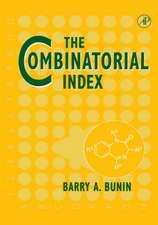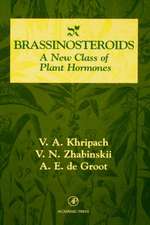Himalayan Phytochemicals: Sustainable Options for Sourcing and Developing Bioactive Compounds
Autor Sumira Jan, Nazia Abbasen Limba Engleză Paperback – 12 apr 2018
In addition, it supports a global shift towards sustainable sourcing of natural products from delicate ecosystems. Across the world, environmental destruction and overharvesting of medicinal plants are reducing and destroying multiple important sources and potential leads before researchers have the chance to discover, explore or synthesize them effectively. By identifying this problem and discussing its impact on the Himalayan region, Himalayan Phytochemicals: Sustainable Options for Sourcing and Developing Bioactive Compounds frames the ongoing global struggle and highlights the key factors that must be considered and addressed when working with phytochemicals from endemic plant sources.
- Reviews both well-known and recently discovered plants of this region
- Highlights methods for phytochemical extraction and analysis
- Provides context to support a shift towards sustainable sourcing of natural products
Preț: 1040.50 lei
Preț vechi: 1143.41 lei
-9% Nou
Puncte Express: 1561
Preț estimativ în valută:
199.16€ • 216.41$ • 167.40£
199.16€ • 216.41$ • 167.40£
Carte tipărită la comandă
Livrare economică 14-28 aprilie
Preluare comenzi: 021 569.72.76
Specificații
ISBN-13: 9780081022276
ISBN-10: 0081022271
Pagini: 316
Dimensiuni: 152 x 229 mm
Greutate: 0.42 kg
Editura: ELSEVIER SCIENCE
ISBN-10: 0081022271
Pagini: 316
Dimensiuni: 152 x 229 mm
Greutate: 0.42 kg
Editura: ELSEVIER SCIENCE
Public țintă
Primary audience: Researchers investigating bioactive agents from natural products as medicinal leads (including medicinal chemists and pharmaceutical scientists). Secondary audience: All groups studying the sustainable cultivation, sourcing and development of bioactive agents from flora in threatened ecosystems (including green chemists, botanists, taxonomists and environmental scientists)Cuprins
1. Biogeographical distribution of medicinal and aromatic herbs
2. Utilization and botanical significance of Himalayan herbs
3. Conservation and cultivation of herbs: Challenge and policy making
4. Chemistry of Himalayan phytochemicals
5. Biotechnological strategies for improvement of aromatic and medicinal herbs
6. Quality assurance and quality control of medicinal and aromatic herbs
7. Marketing indigenous herbs: Connecting link between international trade and Himalayan livelihood
2. Utilization and botanical significance of Himalayan herbs
3. Conservation and cultivation of herbs: Challenge and policy making
4. Chemistry of Himalayan phytochemicals
5. Biotechnological strategies for improvement of aromatic and medicinal herbs
6. Quality assurance and quality control of medicinal and aromatic herbs
7. Marketing indigenous herbs: Connecting link between international trade and Himalayan livelihood















